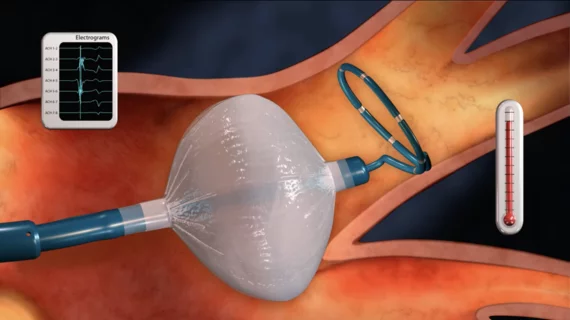Treating AFib early with cryoablation reduces risk of disease progression, repeat hospitalization
Early treatment with cryoablation is associated with better outcomes for atrial fibrillation (AFib) patients than medication alone, according to new research published in the New England Journal of Medicine.[1] The new evidence shows cryoablation can be used as a front-line therapy to skip the step of using medication first. The findings were also presented Monday, Nov. 7, at the American Heart Association (AHA) Scientific Sessions 2022 conference in Chicago.
The PROGRESSIVE-HF study represented a follow-up analysis of the EARLY-AF trial, which examined the effectiveness of treating AFib patients with early cryoballoon ablation as an alternative to prescribing them antiarrhythmic medications. Researchers focused on data from 303 patients who had originally been enrolled in the EARLY-AF trial, including 154 patients who were treated with one of Medtronic’s Arctic Front cryoballoon catheters and 149 patients who received anti-arrhythmic drug therapy.
After 36 months of follow-up, 1.9% of patients in the ablation group and 7.4% of patients in the antiarrhythmic medication group had an episode of persistent AFib. Recurrent atrial tachyarrhythmia, meanwhile, was seen in 56.5% of patients in the ablation group and 77.2% of patients in the antiarrhythmic medication group. In addition, 5.2% of patients in the ablation group had been hospitalized, and 4.5% had experienced a serious adverse event. Among patients in the antiarrhythmic medication group, those numbers were 16.8% and 10.1%, respectively.
“AFib is a chronic and progressive problem,” principal investigator Jason G. Andrade, MD, an associate professor at the University of British Columbia and director of heart rhythm services at Vancouver General Hospital, said in a prepared statement. “By starting with a catheter ablation for some patients, we have the ability to treat early. In the short term, this may be reflected as less recurrences of arrhythmia, improved quality of life and less healthcare utilization. In the long run, this may translate into reduced disease progression, with subsequent reduction in the risk of stroke, heart failure and premature mortality. For the first time, these results clearly demonstrate that as an initial approach to AFib therapy, a Medtronic cryoablation is disease modifying and significantly lowers the progression of AFib.”
“This is an exciting milestone in the treatment of AFib,” added Rebecca Seidel, president of Medtronic’s cardiac ablation solutions division. “Beyond the ongoing validation these data provide into the superior outcomes of a Medtronic cryoablation over drug therapy, an early approach to treating AFib has the potential to change the trajectory of disease for millions of patients.”
Rethinking AFib treatment
In a separate statement published by the University of British Columbia, Andrade highlighted the importance of these findings.
“The evidence shows increasingly that it’s time to rethink how we approach the treatment of AFib,” he said. “With effective early intervention, we can keep people healthy, happy, and out of hospital, which would be a tremendous benefit for patients and their families, and also our entire health system.”
One of those benefits for the health system, as noted in the statement, is the potential cost savings that could be linked to this new approach to patient care. Treating patients earlier, and reducing additional AFib episodes and repeat hospitalizations, could make a massive impact on the costs associated with treating this aging patient population.

